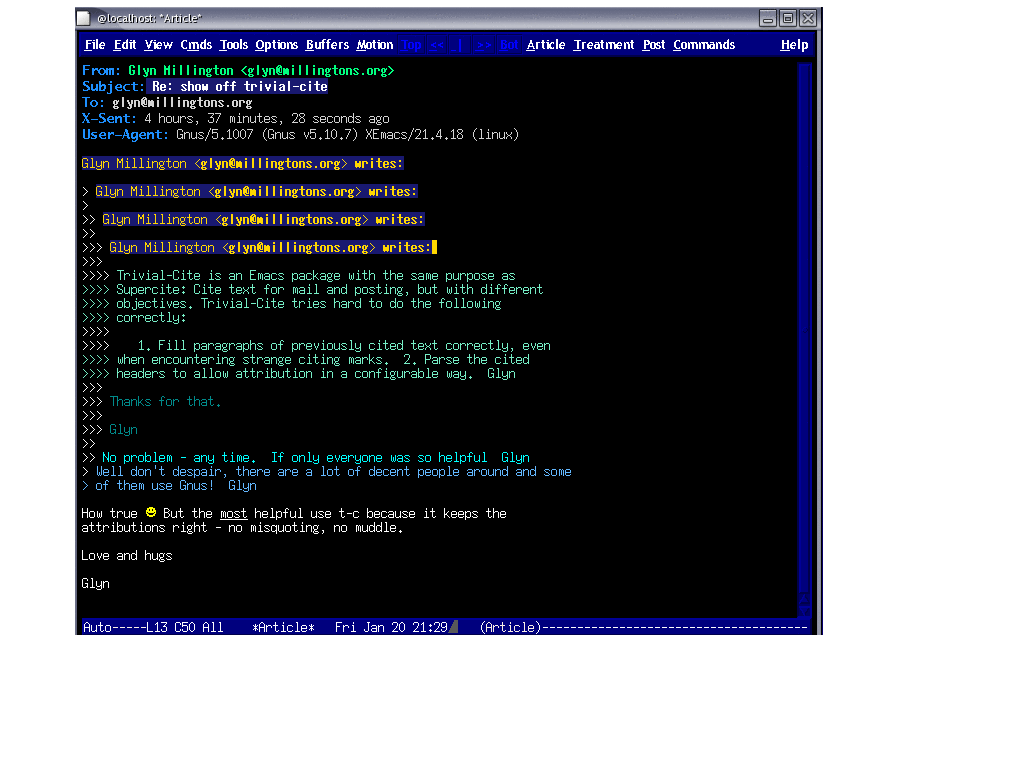
Gnus is a wonderful message-reader for both mail and Usenet. The only drawback is that only Emacs/XEmacs/SXEmacs users can use it! Gnus is very well documented and the FAQ and Tutorial can be found here. On this page are a few details of various handy extensions to the basic program.
Get those citations of other people's posts set out properly. Trivial-Cite aims to acheive the following:-
Get it from - ah well, that's the trouble - it's hard to find, but it is buried nowadays in the Debian emacs-goodies package - so extract it from there and and put it somewhere in your load-path - that is add
(setq load-path (cons "/home/user/path/to/your/elisp" load-path))
This is the incantation I use to get tc up and running:-
(setq message-cite-function 'trivial-cite
tc-normal-citemarks ">|:"
tc-fill-long-lines nil
tc-make-attribution 'tc-fancy-attribution)
(setq message-cite-function 'message-cite-original-without-signature)
And this is what it looks like in use.

The indispensable Big Brother Data Base. Everybody needs an address-book! You can grab the code here - the development version seems pretty stable.
It provides the following features:
One can have lots of fun with the BBDB, but the incantation to get the show on the road
(require 'bbdb-hooks)
(add-hook 'gnus-startup-hook 'bbdb-insinuate-gnus)
;;;make sure it doesn'tpop up when not wanted
(setq bbdb-use-pop-up 'horiz)
You may have thought that headers were rather boring - well here are some different ways of making headers more "interesting" - or in the case of the liturgical calendar, more useful. Well, I find it useful!
The cal-catholic package is intended to be a drop-in extension to Ed Reingold's calendar package in emacs. It calculates each day's Roman Catholic liturgical data and can be extended to present all sorts of other daily information, such as Mass readings and prayers, the Liturgy of the Hours, the Roman Martyrology, etc. Good eh?! Get it here.
The Lisp for launching this absolutely essential piece of kit is this:-
("X-Liturgical-Date"
(progn
(let* ((catholic-info (symbol-value (intern-soft (calendar-catholic-variable-name (rc-current-date)))))
(type (cdr (assoc 'type catholic-info)))
(name (cdr (assoc 'name catholic-info)))
(year (concat "A.D. " (format-time-string "%Y"))))
(format "%s: %s, %s" type name year))))
Drop these lines into the posting-style section of .gnus.
Time for a little culture? shakespeare-quote.el inserts a random quotation from the Bard into your headers. Get it here. At some point I would like to use this as a base for inserting random Biblical quotations into headers - more as an exercise in lisp rather than in the hope of mass conversions!
To make it happen ....
(add-hook 'gnus-message-setup-hook 'shq-insert-quote)
Here is a picture showing these headers inserted automatically by Gnus when composing a message:-

Last modified: Tue Nov 18 22:20:33 GMT 2008